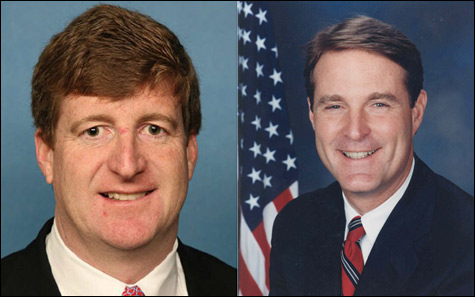
FEW LEFT: The GOP has tried to spin high-profile resignations, including those of Rhode Island congressman Patrick Kennedy(left) and Indiana senator Evan Bayh, as a symptom of an impending Republican take-over.
|
Last Thursday, Patrick Kennedy of Rhode Island — the last of his legendary clan in Congress — announced that he will not run for re-election. Four days later, Indiana's Evan Bayh revealed his own intention to retire from the US Senate. Any day now, we should get a decision from South Shore congressman Bill Delahunt, who has done nothing to tamp down growing rumors that he, too, is calling an end to his career.
It's been only four weeks since Scott Brown turned the political world upside-down by winning the Senate seat controlled by the Kennedy family for more than a half-century, and already another story line has taken hold: terrified Democrats fleeing from office, rather than seeking re-election.
The question doesn't seem to be whether there will be more retirements announced, but who will be next. The rumor list is too long to recount. A single, speculative blog post on Monday put the nation's political media on a death watch for Maryland senator Barbara Mikulski.
So far, 11 sitting US senators — five Democrats, but also six Republicans — have announced that they will not run for re-election in November. So have 32 House members (13 Democrats and 19 Republicans), and seven governors (three Democrats and four Republicans).
While these are not record-breaking numbers, they are high for a year without an obvious retirement-driving force — such as redistricting, which usually prompts many congressmen to abandon hope of winning their re-drawn districts; or a change in party control of a chamber, such as the 2006 Democratic takeover of the House and Senate, which drove many Republicans to leave office as they discovered that life in the minority is not as much fun.
The GOP would like to spin this year's high-profile flights from office as a case of Democrats running scared of a Republican wave, but that explanation doesn't fly — there are as many Republicans leaving office as Democrats, and incumbents like Bayh and Kennedy had little fear of losing in November.
No, there is no single explanation for what's happening. But there is something going on.
We are in the midst of a highly volatile political atmosphere, steeped in the brutal power politics of the GOP and stirred up by economic distress.
Since the early 1990s, Republicans have been following a scorched-earth policy, and have stepped up their game with renewed fury since losing power in the 2006 and 2008 elections. GOP leadership believes that their party — having so few incumbents — will benefit most from a national throw-the-bums-out election. As a result, they are determined to grind the gears of government to a halt.
High turnover
In ordinary times, Americans probably wouldn't care much that Washington is stuck, if they even noticed at all. But in a time of deep recession, people turn their eyes to their government leaders. Voters who were never exactly big fans of Washington have devolved into angry, protesting screamers: congressional town-hall meetings have become venues for venomous outbursts; many members will no longer hold them. Elected officials have found themselves hung in effigy, and had their offices broken into. Both sides are constantly insulted and mocked by the opposing media.